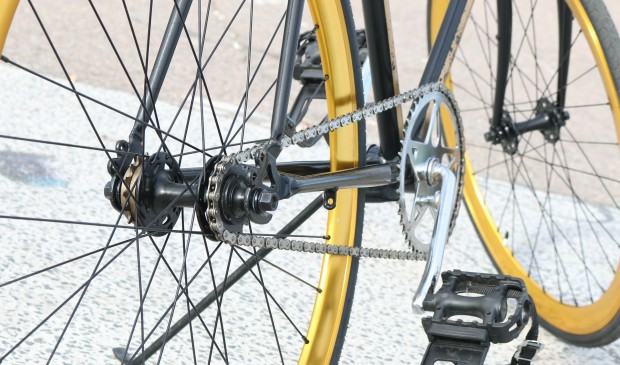-

Newsletter Signup
The Austin Monitor thanks its sponsors. Become one.
Most Popular Stories
- New zoning would allow huge building on South Congress
- Austin City Council passes new police contract
- Public lines up to oppose police contract
- With backing from a Parkland survivor, Travis County begins hospital-based gun violence prevention program
- City shares update on parks-nonprofit relationships
-
Discover News By District

Bicycle theft reports, registrations on the rise
Monday, July 13, 2015 by Tyler Whitson
Bicycle theft is an issue in every city, and Austin, with its enthusiastic cycling community, is no exception. Data that the Austin Monitor obtained from the Austin Police Department show that the number of reported bicycle thefts has increased slightly in the past year, though that corresponds with a spike in the average number of bicycles registered with the department every month.
From July 2014 through June 2015, there was an average of about 121 cases reported to the APD every month, a two-per-month increase over the previous 12-month period. During the same time frame, average monthly registrations increased from about 51 to about 79.
While theft reports and registrations have increased in the past year, the average number of cases “cleared” per month — due to police arresting a suspect or a filer canceling a report — decreased in the past year from 5.75 to 2.33.
Jennifer Herber, a spokesperson for the APD, told the Monitor on Friday that the apparent drop may be related to reports filed in the past year having had less time to clear than the older ones and investigators having had less time to work on the cases. She also pointed out that an arrest doesn’t necessarily mean recovery of stolen property.
Senior Police Officer Justin Berry with the APD Downtown Area Command Metro Tactical Unit commented on the theft report increase in an interview with the Monitor on Friday.
“Being a larger city, with more people moving to Austin every single day, you’re going to have that natural trend of increased bike thefts,” Berry said. “So, the more bicycles in the community, the more bikes that are being locked up in park places, the more opportunities thieves have to steal those bicycles.”
Berry said that his unit responded to this problem last year by establishing an ongoing downtown bicycle recovery operation that uses–among other tools–theft reports, crime data and strategically placed “bait” bicycles.
“We’ll try and target some of these people that are known habitual offenders, we’ll conduct surveillance operations on them, deploy bait operations in front of them and just see if they take it,” he said.
Berry added that his unit has worked with other agencies to engage in more complex operations in the past year. These efforts, he said, led to officials charging four individuals suspected of participating in a crime operation involving bike thefts in several Texas cities.
Current bicycle registration figures also appear to show a major upward trend over the past few years, with the average number of registered bicycles jumping to current figures from a little over two per month in the period of July 2011 through June 2012. This uptick could signify an increase in the number of bicycles in the city, an increased awareness of the registration system or both.
APD Detective Bing Lowe, who handles many of the department’s bicycle theft cases, told the Monitor on Friday why he believes the numbers are increasing. “I think the word has gotten out that it’s a good thing to do to get it registered,” he said.
Berry asserted that registration of bicycles and filing of police reports play an important role in successful bicycle recoveries. “It increases the odds of recovering your stolen property,” he said, adding that the APD encourages residents to register their bikes online and has held occasional registration drives and events in the past couple of years.
“We need the community’s help by registering their bicycles, so that when we come across bicycles, we have a way to run them and recover them and find persons of interest and, hopefully, eventually file warrants on them for their victims,” Berry said.
Registration, Berry said, ensures that the APD has the bicycle’s serial number in case it is stolen and the owner files a police report. Those steps, he continued, help police officers identify the bicycle and give them the ability to register it with a national database that pawn shop owners are required to check when purchasing bicycles and other items.
The database, Berry explained, can help victims recover their bicycles even if thieves take them to another city, which is known to happen. “We have seen bikes go to other cities because (the thieves) believe it’s easier to get away with,” he said.
Berry suggested that citizens exercise caution if they believe they see someone in possession of a stolen bicycle.
“It’s not always the best idea to confront the person,” Berry said. “It may be better to snap a quick photo on your cellphone of the person and call 911 so we can try to get an officer out there to the scene. If that person gets away before the officer’s there, you at least have a photograph of the person that we can then (use to) go forward with working on your case.”
You're a community leader
And we’re honored you look to us for serious, in-depth news. You know a strong community needs local and dedicated watchdog reporting. We’re here for you and that won’t change. Now will you take the powerful next step and support our nonprofit news organization?







